人教新目标版英语七年级下Unit 4 Don't eat in class.复习课件(共21张PPT)
文档属性
| 名称 | 人教新目标版英语七年级下Unit 4 Don't eat in class.复习课件(共21张PPT) | 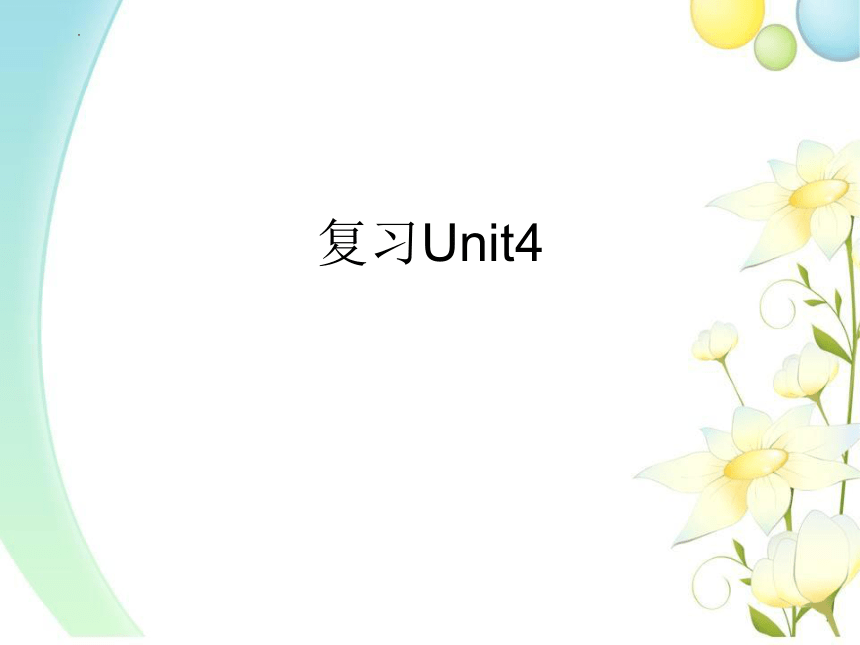 | |
| 格式 | zip | ||
| 文件大小 | 183.4KB | ||
| 资源类型 | 教案 | ||
| 版本资源 | 人教新目标(Go for it)版 | ||
| 科目 | 英语 | ||
| 更新时间 | 2022-07-26 22:03:11 | ||
图片预览

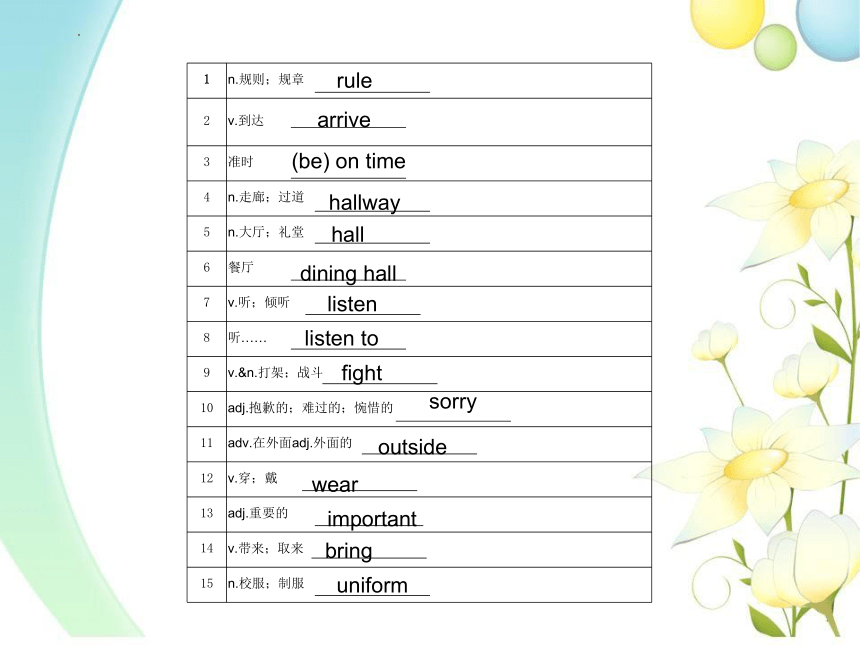
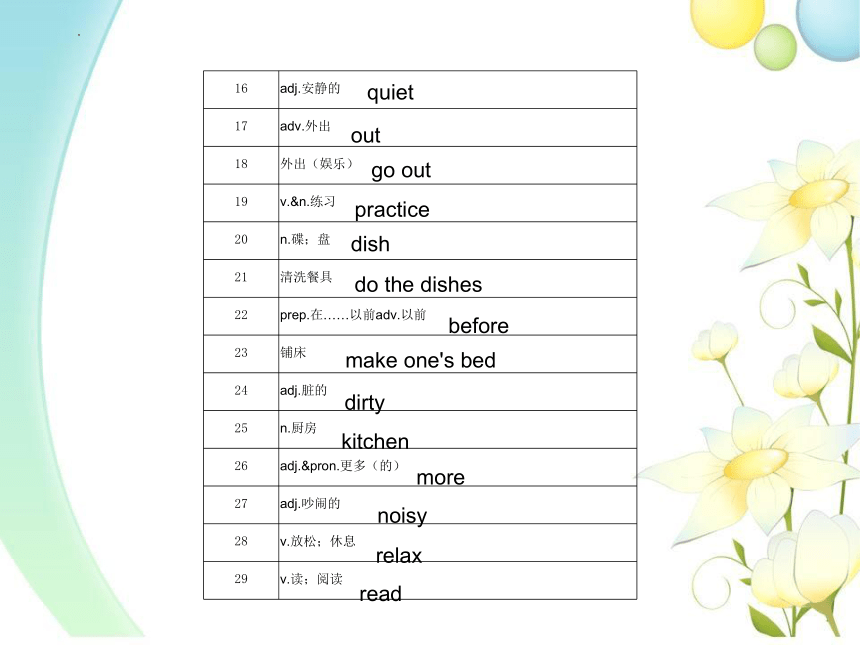
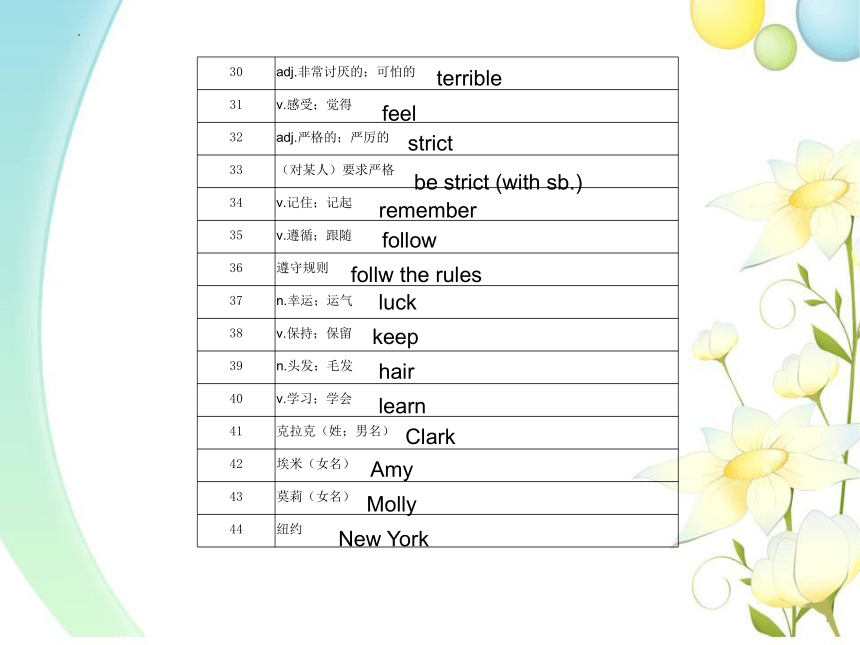
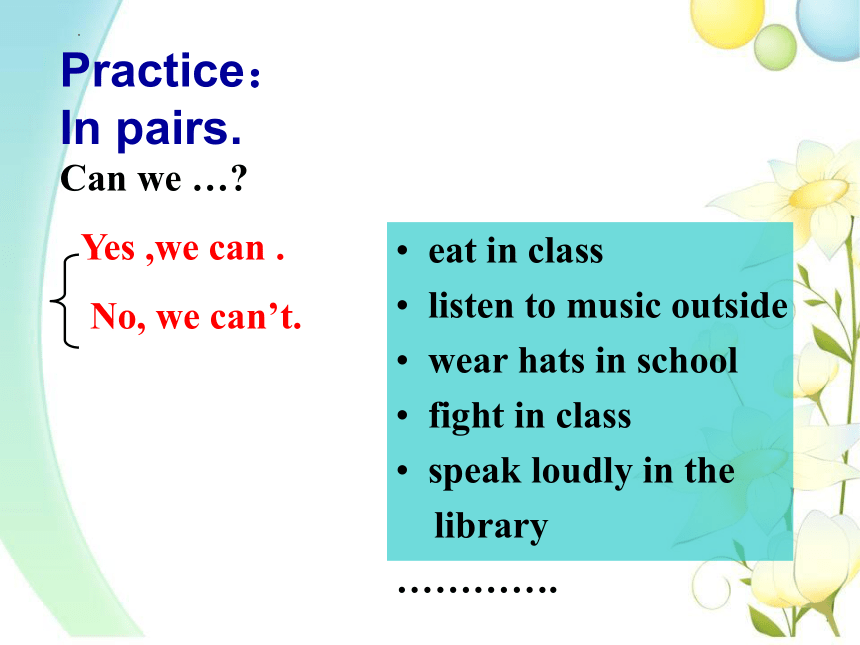
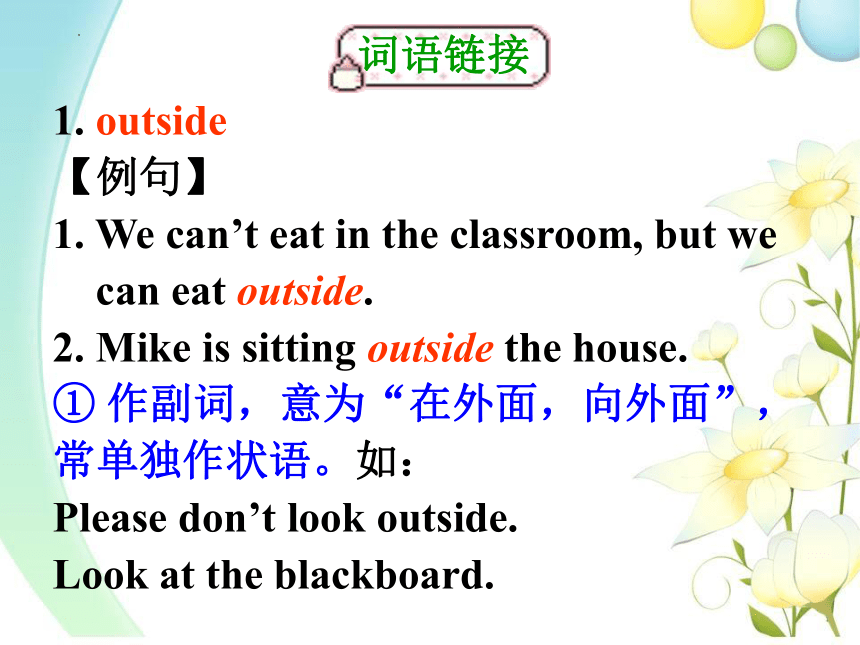
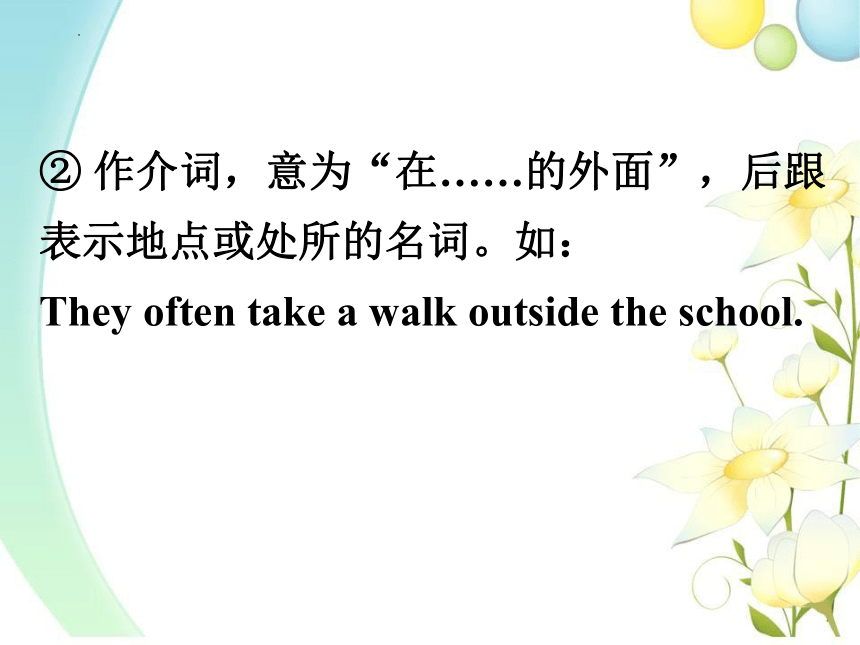
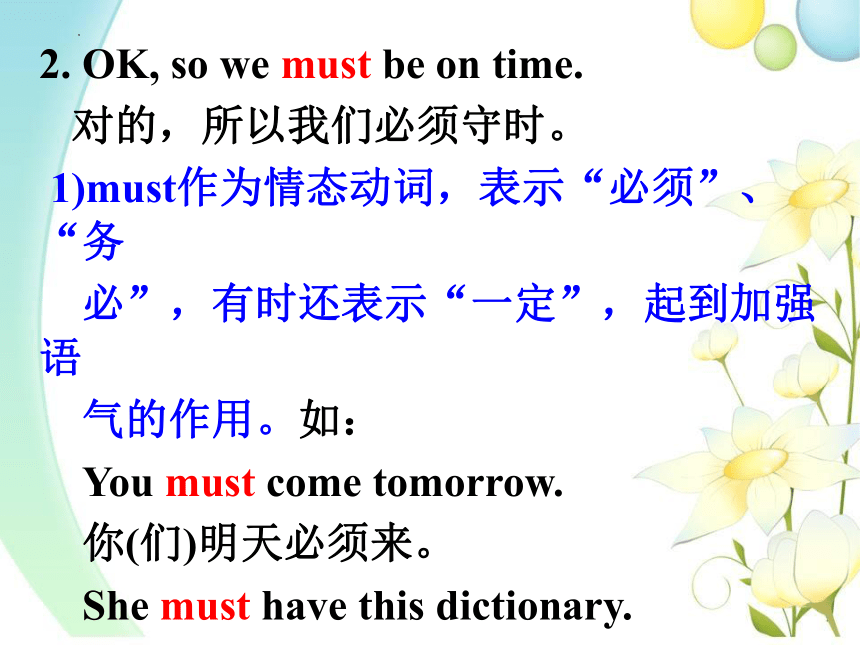
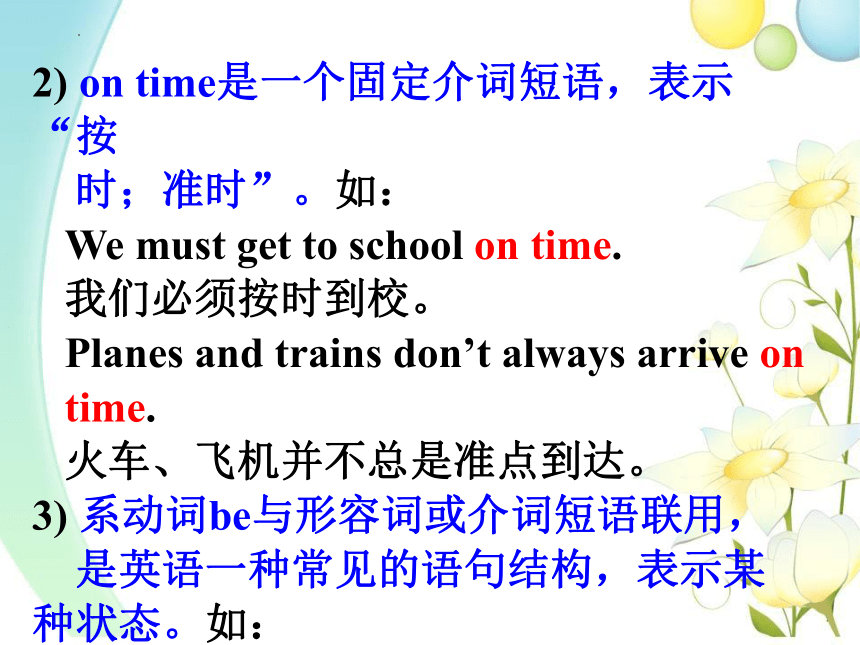
文档简介
(共21张PPT)
复习Unit4
1 n.规则;规章
2 v.到达
3 准时
4 n.走廊;过道
5 n.大厅;礼堂
6 餐厅
7 v.听;倾听
8 听……
9 v.&n.打架;战斗
10 adj.抱歉的;难过的;惋惜的
11 adv.在外面adj.外面的
12 v.穿;戴
13 adj.重要的
14 v.带来;取来
15 n.校服;制服
rule
arrive
(be) on time
hallway
hall
dining hall
listen
listen to
fight
sorry
outside
wear
important
bring
uniform
16 adj.安静的
17 adv.外出
18 外出(娱乐)
19 v.&n.练习
20 n.碟;盘
21 清洗餐具
22 prep.在……以前adv.以前
23 铺床
24 adj.脏的
25 n.厨房
26 adj.&pron.更多(的)
27 adj.吵闹的
28 v.放松;休息
29 v.读;阅读
quiet
out
go out
practice
dish
do the dishes
before
make one's bed
dirty
kitchen
more
noisy
relax
read
30 adj.非常讨厌的;可怕的
31 v.感受;觉得
32 adj.严格的;严厉的
33 (对某人)要求严格
34 v.记住;记起
35 v.遵循;跟随
36 遵守规则
37 n.幸运;运气
38 v.保持;保留
39 n.头发;毛发
40 v.学习;学会
41 克拉克(姓;男名)
42 埃米(女名)
43 莫莉(女名)
44 纽约
terrible
feel
strict
be strict (with sb.)
remember
follow
follw the rules
luck
keep
hair
learn
Clark
Amy
Molly
New York
Practice:In pairs.
Can we …
Yes ,we can .
No, we can’t.
eat in class
listen to music outside
wear hats in school
fight in class
speak loudly in the
library
………….
1. outside
【例句】
1. We can’t eat in the classroom, but we
can eat outside.
2. Mike is sitting outside the house.
① 作副词,意为“在外面,向外面”,
常单独作状语。如:
Please don’t look outside.
Look at the blackboard.
词语链接
② 作介词,意为“在……的外面”,后跟
表示地点或处所的名词。如:
They often take a walk outside the school.
2. OK, so we must be on time.
对的,所以我们必须守时。
1)must作为情态动词,表示“必须”、“务
必”,有时还表示“一定”,起到加强语
气的作用。如:
You must come tomorrow.
你(们)明天必须来。
She must have this dictionary.
她一定有这本字典。
2) on time是一个固定介词短语,表示“按
时;准时”。如:
We must get to school on time.
我们必须按时到校。
Planes and trains don’t always arrive on
time.
火车、飞机并不总是准点到达。
3) 系动词be与形容词或介词短语联用,
是英语一种常见的语句结构,表示某种状态。如:
be quiet 保持安静;be strict 要求严格
be on time 守时; be at work 在上班
这种用法中,动词be主要承担着连系句
子的语法功能,其后的形容词或介词短
语则起着表意的作用。如:
you mustn’t be noisy, children.
孩子们,你们一定不可喧闹。
At this time of the day, children are at
school. 一天中的这个时候,孩子们在
学校上课呢。
3. hear, listen和sound都有“听”的意思,
但三者是有区别的。
1) hear “听说”, 侧重于“听”的内容。
I’m sorry to hear that you are ill.
听说你生病了, 我很难过。
I never heard such an interesting story.
我从来没听过这么有趣的一个故事。
2) listen“听”侧重于“听”这一动作。Listen to me carefully.
认真听我说。
The children like to listen to music. 孩子们喜欢听音乐。
3) sound“听起来”,它是系动词, 后面接形容词等。
That sounds great. 那听起来真不错。
It sounds like fun. 听起来挺有趣。
4. arrive late for 与be late for 意思相近,
都表示“迟到”。
Don’t arrive /be late for school.
上学别迟到。
I arrived/was late for the meeting
yesterday.
我昨天开会迟到了。
5. 情态动词have to 的用法:
意思是“必须、不得不”,它侧重于客观上
的必要和外界的权威。
1) 结构:主语+have to+动词原形+其他
(一般现在时,主语是第三人称单数时, 用
has to;句子是过去时, 用had to) 如:
We have to wear sneakers for gym class. 在体育课上,我们必须穿运动鞋。
Tom has to practice the guitar every day. 汤姆每天必须练习弹吉它。
I had to get up at 5:00 am last Monday. 上周一我不得不早上5点起床。
2) 否定形式:主语+don’t have to+动
词原形+其他 (一般现在时,主语是第
三人称单数时, 用doesn’t have to; 句子
是过去时, 用didn’t have to) 如:
Nick doesn’t have to wear a uniform.
尼克不必穿制服。
We didn’t have to do our homework
at once.
我们不必马上完成作业。
3) 疑问句:
Do (Does或Did) +主语+have to +动词
原形+其他 如:
Do you have to stay at home on
weekends
周末你必须呆在家里吗
Yes, I do. / No, I don’t.
是的, 我必须。 不, 我不必。
Grammar:
Example:
肯定祈使句 否定祈使句
Sit down.
Come in.
Eat in the hallways.
Listen to music in class.
5. Do your homework on Sunday night.
Don’t sit down.
Don’t come in.
Don’t eat in the hallways.
Don’t listen to music in class.
Don’t do your homework on Sunday night.
表示请求,建议,命令,禁止等语气的句子, 其结构为省去主语you,以动词原形开头的简单句 。
祈使句
2. 句子结构
(1) 肯定句:__________+ 其他
在餐厅里吃东西。
________________________________
在音乐教室里听音乐。
________________________________
骑自行车去上学。
_________________________________
Ride the bike to school.
Eat in the dining hall.
动词原形
Listen to music in the music room.
(2) 否定句: _____ + _________+ 其他
不要和同学们打架。
_______________________________
不要在教室里打篮球。
________________________________
Don’t fight with your classmates.
Don’t play basketball in the classroom.
Don’t 动词原形
以let引起的句子 ____+ sb.+动词原形 让我们步行去上学吧。 _________________
(4) No + 动词-ing形式。表示“禁止、规劝”
禁止停车!No Parking.
禁止吸烟!No Smoking.
Let
Let’s walk to school.
复习Unit4
1 n.规则;规章
2 v.到达
3 准时
4 n.走廊;过道
5 n.大厅;礼堂
6 餐厅
7 v.听;倾听
8 听……
9 v.&n.打架;战斗
10 adj.抱歉的;难过的;惋惜的
11 adv.在外面adj.外面的
12 v.穿;戴
13 adj.重要的
14 v.带来;取来
15 n.校服;制服
rule
arrive
(be) on time
hallway
hall
dining hall
listen
listen to
fight
sorry
outside
wear
important
bring
uniform
16 adj.安静的
17 adv.外出
18 外出(娱乐)
19 v.&n.练习
20 n.碟;盘
21 清洗餐具
22 prep.在……以前adv.以前
23 铺床
24 adj.脏的
25 n.厨房
26 adj.&pron.更多(的)
27 adj.吵闹的
28 v.放松;休息
29 v.读;阅读
quiet
out
go out
practice
dish
do the dishes
before
make one's bed
dirty
kitchen
more
noisy
relax
read
30 adj.非常讨厌的;可怕的
31 v.感受;觉得
32 adj.严格的;严厉的
33 (对某人)要求严格
34 v.记住;记起
35 v.遵循;跟随
36 遵守规则
37 n.幸运;运气
38 v.保持;保留
39 n.头发;毛发
40 v.学习;学会
41 克拉克(姓;男名)
42 埃米(女名)
43 莫莉(女名)
44 纽约
terrible
feel
strict
be strict (with sb.)
remember
follow
follw the rules
luck
keep
hair
learn
Clark
Amy
Molly
New York
Practice:In pairs.
Can we …
Yes ,we can .
No, we can’t.
eat in class
listen to music outside
wear hats in school
fight in class
speak loudly in the
library
………….
1. outside
【例句】
1. We can’t eat in the classroom, but we
can eat outside.
2. Mike is sitting outside the house.
① 作副词,意为“在外面,向外面”,
常单独作状语。如:
Please don’t look outside.
Look at the blackboard.
词语链接
② 作介词,意为“在……的外面”,后跟
表示地点或处所的名词。如:
They often take a walk outside the school.
2. OK, so we must be on time.
对的,所以我们必须守时。
1)must作为情态动词,表示“必须”、“务
必”,有时还表示“一定”,起到加强语
气的作用。如:
You must come tomorrow.
你(们)明天必须来。
She must have this dictionary.
她一定有这本字典。
2) on time是一个固定介词短语,表示“按
时;准时”。如:
We must get to school on time.
我们必须按时到校。
Planes and trains don’t always arrive on
time.
火车、飞机并不总是准点到达。
3) 系动词be与形容词或介词短语联用,
是英语一种常见的语句结构,表示某种状态。如:
be quiet 保持安静;be strict 要求严格
be on time 守时; be at work 在上班
这种用法中,动词be主要承担着连系句
子的语法功能,其后的形容词或介词短
语则起着表意的作用。如:
you mustn’t be noisy, children.
孩子们,你们一定不可喧闹。
At this time of the day, children are at
school. 一天中的这个时候,孩子们在
学校上课呢。
3. hear, listen和sound都有“听”的意思,
但三者是有区别的。
1) hear “听说”, 侧重于“听”的内容。
I’m sorry to hear that you are ill.
听说你生病了, 我很难过。
I never heard such an interesting story.
我从来没听过这么有趣的一个故事。
2) listen“听”侧重于“听”这一动作。Listen to me carefully.
认真听我说。
The children like to listen to music. 孩子们喜欢听音乐。
3) sound“听起来”,它是系动词, 后面接形容词等。
That sounds great. 那听起来真不错。
It sounds like fun. 听起来挺有趣。
4. arrive late for 与be late for 意思相近,
都表示“迟到”。
Don’t arrive /be late for school.
上学别迟到。
I arrived/was late for the meeting
yesterday.
我昨天开会迟到了。
5. 情态动词have to 的用法:
意思是“必须、不得不”,它侧重于客观上
的必要和外界的权威。
1) 结构:主语+have to+动词原形+其他
(一般现在时,主语是第三人称单数时, 用
has to;句子是过去时, 用had to) 如:
We have to wear sneakers for gym class. 在体育课上,我们必须穿运动鞋。
Tom has to practice the guitar every day. 汤姆每天必须练习弹吉它。
I had to get up at 5:00 am last Monday. 上周一我不得不早上5点起床。
2) 否定形式:主语+don’t have to+动
词原形+其他 (一般现在时,主语是第
三人称单数时, 用doesn’t have to; 句子
是过去时, 用didn’t have to) 如:
Nick doesn’t have to wear a uniform.
尼克不必穿制服。
We didn’t have to do our homework
at once.
我们不必马上完成作业。
3) 疑问句:
Do (Does或Did) +主语+have to +动词
原形+其他 如:
Do you have to stay at home on
weekends
周末你必须呆在家里吗
Yes, I do. / No, I don’t.
是的, 我必须。 不, 我不必。
Grammar:
Example:
肯定祈使句 否定祈使句
Sit down.
Come in.
Eat in the hallways.
Listen to music in class.
5. Do your homework on Sunday night.
Don’t sit down.
Don’t come in.
Don’t eat in the hallways.
Don’t listen to music in class.
Don’t do your homework on Sunday night.
表示请求,建议,命令,禁止等语气的句子, 其结构为省去主语you,以动词原形开头的简单句 。
祈使句
2. 句子结构
(1) 肯定句:__________+ 其他
在餐厅里吃东西。
________________________________
在音乐教室里听音乐。
________________________________
骑自行车去上学。
_________________________________
Ride the bike to school.
Eat in the dining hall.
动词原形
Listen to music in the music room.
(2) 否定句: _____ + _________+ 其他
不要和同学们打架。
_______________________________
不要在教室里打篮球。
________________________________
Don’t fight with your classmates.
Don’t play basketball in the classroom.
Don’t 动词原形
以let引起的句子 ____+ sb.+动词原形 让我们步行去上学吧。 _________________
(4) No + 动词-ing形式。表示“禁止、规劝”
禁止停车!No Parking.
禁止吸烟!No Smoking.
Let
Let’s walk to school.
同课章节目录
- Unit 1 Can you play the guitar?
- Section A
- Section B
- Unit 2 What time do you go to school?
- Section A
- Section B
- Unit 3 How do you get to school?
- Section A
- Section B
- Unit 4 Don't eat in class.
- Section A
- Section B
- Unit 5 Why do you like pandas?
- Section A
- Section B
- Unit 6 I'm watching TV.
- Section A
- Section B
- Review of Units 1-6
- Unit 7 It's raining!
- Section A
- Section B
- Unit 8 Is there a post office near here?
- Section A
- Section B
- Unit 9 What does he look like?
- Section A
- Section B
- Unit 10 I'd like some noodles.
- Section A
- Section B
- Unit 11 How was your school trip?
- Section A
- Section B
- Unit 12 What did you do last weekend?
- Section A
- Section B
